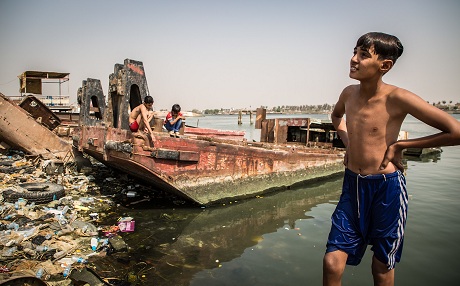ERBIL, Kurdistan Region – Children in Basra going back to class in schools with “totally collapsed” water and sanitation facilities face health risks, warned an NGO on Tuesday.
“With classes just reopening after summer, more than 800 schools are now breeding grounds for an epidemic of water-borne diseases, including cholera, as temperatures drop in the coming weeks,” said Wolfgang Gressmann, Iraq director for the Norwegian Refugee Council (NRC).
The NGO said that 277,000 children are at risk at the schools “where water and sanitation facilities have totally collapsed.”
Overcrowded classrooms are contributing to the problem and may cause a “public health disaster” for the city.
More than 100,000 people in Basra have been made ill from contaminated water. The lack of clean water – due to pollution and dilapidated infrastructure – was one of the driving factors behind deadly protests in the southern Iraqi province this summer.
According to NRC, 3,780 people in rural areas of southern Iraq were forced to leave their homes in August because of water shortages.
“Residents told NRC that access to clean water was a key source of tension and even armed violence in the community,” the NGO stated.

Children swim in the trash-strewn Shat al-Arab river in Basra. Photo: Tom Peyre-Costa/NRC
While the whole country is suffering from a shortage of water, caused by an accumulation of factors like climate change, waste, and disputes over cross-border sharing of water, the UN estimates that as much as a quarter of the population in the south of the country is at increased risk of water-borne diseases and displacement.
The Iraqi government has scrambled to revive defunct projects and inject cash into Basra province, which is one of the poorest in the country despite its oil wealth.
Prime Minister Haider al-Abadi toured a water facility in the province in September as part of a public relations drive to demonstrate his government’s commitment to the province.
The Basra protests were a factor in denying Abadi a second term as prime minister.
“With classes just reopening after summer, more than 800 schools are now breeding grounds for an epidemic of water-borne diseases, including cholera, as temperatures drop in the coming weeks,” said Wolfgang Gressmann, Iraq director for the Norwegian Refugee Council (NRC).
The NGO said that 277,000 children are at risk at the schools “where water and sanitation facilities have totally collapsed.”
Overcrowded classrooms are contributing to the problem and may cause a “public health disaster” for the city.
More than 100,000 people in Basra have been made ill from contaminated water. The lack of clean water – due to pollution and dilapidated infrastructure – was one of the driving factors behind deadly protests in the southern Iraqi province this summer.
According to NRC, 3,780 people in rural areas of southern Iraq were forced to leave their homes in August because of water shortages.
“Residents told NRC that access to clean water was a key source of tension and even armed violence in the community,” the NGO stated.

Children swim in the trash-strewn Shat al-Arab river in Basra. Photo: Tom Peyre-Costa/NRC
While the whole country is suffering from a shortage of water, caused by an accumulation of factors like climate change, waste, and disputes over cross-border sharing of water, the UN estimates that as much as a quarter of the population in the south of the country is at increased risk of water-borne diseases and displacement.
The Iraqi government has scrambled to revive defunct projects and inject cash into Basra province, which is one of the poorest in the country despite its oil wealth.
Prime Minister Haider al-Abadi toured a water facility in the province in September as part of a public relations drive to demonstrate his government’s commitment to the province.
The Basra protests were a factor in denying Abadi a second term as prime minister.



Comments
Rudaw moderates all comments submitted on our website. We welcome comments which are relevant to the article and encourage further discussion about the issues that matter to you. We also welcome constructive criticism about Rudaw.
To be approved for publication, however, your comments must meet our community guidelines.
We will not tolerate the following: profanity, threats, personal attacks, vulgarity, abuse (such as sexism, racism, homophobia or xenophobia), or commercial or personal promotion.
Comments that do not meet our guidelines will be rejected. Comments are not edited – they are either approved or rejected.
Post a comment